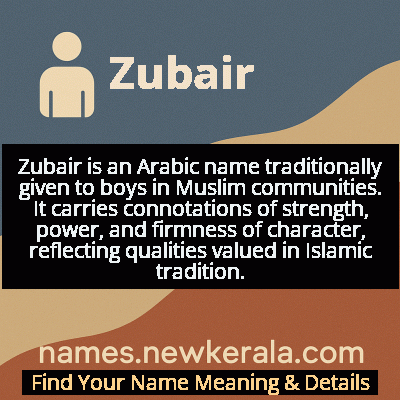Zubair Name Meaning & Details
Origin, Popularity, Numerology Analysis & Name Meaning of Zubair
Discover the origin, meaning, and cultural significance of the name ZUBAIR. Delve into its historical roots and explore the lasting impact it has had on communities and traditions.
Name
Zubair
Gender
Male
Origin
Muslim
Lucky Number
5
Meaning of the Name - Zubair
Zubair is an Arabic name traditionally given to boys in Muslim communities. It carries connotations of strength, power, and firmness of character, reflecting qualities valued in Islamic tradition.
Zubair - Complete Numerology Analysis
Your Numerology Number
Based on Pythagorean Numerology System
Ruling Planet
Mercury
Positive Nature
Adventurous, dynamic, curious, and social.
Negative Traits
Restless, impatient, inconsistent, prone to indulgence.
Lucky Colours
Green, white.
Lucky Days
Wednesday.
Lucky Stones
Emerald.
Harmony Numbers
1, 3, 9.
Best Suited Professions
Sales, marketing, travel, entertainment.
What People Like About You
Versatility, charisma, adventurous spirit.
Famous People Named Zubair
Zubair ibn al-Awwam
Companion of Prophet Muhammad
One of the first converts to Islam and among the ten companions promised Paradise
Zubair Ali Zai
Islamic Scholar
Renowned Pakistani hadith scholar and researcher known for his work in Islamic sciences
Zubair Ahmed
Cricketer
Pakistani cricketer who played for the national team and various domestic teams
Zubair Khan
Politician
Indian politician who served as the Chief Minister of Madhya Pradesh
Name Variations & International Equivalents
Click on blue names to explore their detailed meanings. Gray names with will be available soon.
Cultural & Historical Significance
Throughout Islamic history, the name Zubair has been passed down through generations as a means of honoring this important historical figure and instilling values of bravery, faith, and loyalty in children. In many Muslim societies, naming a child Zubair is considered a way to connect them to the noble heritage of early Islam and its exemplary personalities. The name carries with it expectations of strong character and principled behavior, reflecting the qualities of its most famous bearer. This cultural significance extends beyond religious contexts into broader social and familial traditions where the name symbolizes heritage, strength, and Islamic identity.
Extended Personality Analysis
Individuals named Zubair are typically perceived as possessing strong character, determination, and principled behavior. They often exhibit natural leadership qualities and a quiet confidence that commands respect from others. Drawing from the historical legacy of Zubair ibn al-Awwam, those bearing this name are often associated with traits of courage, loyalty, and steadfastness in adversity. They tend to be reliable and trustworthy individuals who approach responsibilities with seriousness and dedication.
Zubairs are frequently seen as protective figures within their families and communities, demonstrating a strong sense of justice and fairness in their interactions. They possess a resilience that enables them to navigate challenges while maintaining their core values. Their personality often blends traditional principles with modern adaptability, allowing them to function effectively in various social contexts. Many Zubairs are thoughtful decision-makers who carefully consider consequences before acting, and they typically maintain a calm demeanor even in stressful situations. This combination of strength and thoughtfulness makes them valued members of their social and professional circles.
Modern Usage & Popularity
In contemporary times, Zubair maintains steady popularity as a traditional Islamic name across Muslim communities worldwide. It is particularly prevalent in South Asian countries like Pakistan, India, and Bangladesh, as well as in Arab nations and among Muslim diaspora communities in Western countries. The name has experienced consistent usage rather than dramatic popularity fluctuations, positioning it as a classic choice that transcends temporary naming trends. Recent years have seen renewed interest in traditional Islamic names, which has helped sustain Zubair's relevance among new generations of parents. The name appeals to those seeking to honor Islamic heritage while providing their child with a strong, meaningful identity that connects them to important historical figures. Its usage spans various socioeconomic backgrounds and remains equally popular in both urban and rural settings, demonstrating its broad cultural acceptance.
Symbolic & Spiritual Meanings
Symbolically, Zubair represents the embodiment of strength, resilience, and unwavering principle. The name carries deep metaphorical significance as a symbol of moral fortitude and the ability to maintain one's convictions in the face of adversity. It represents the concept of protective strength—not merely physical power, but the courage to defend truth and protect the vulnerable. The name evokes imagery of a steadfast foundation or an unshakable pillar that supports and strengthens communities. Metaphorically, Zubair symbolizes the bridge between honorable tradition and contemporary application, representing individuals who carry forward valuable heritage while engaging with modern challenges. It suggests a person who serves as an anchor in turbulent times and a beacon of reliability for those around them. The symbolic meaning extends to represent loyalty that withstands testing circumstances and faith that remains firm through life's challenges.

